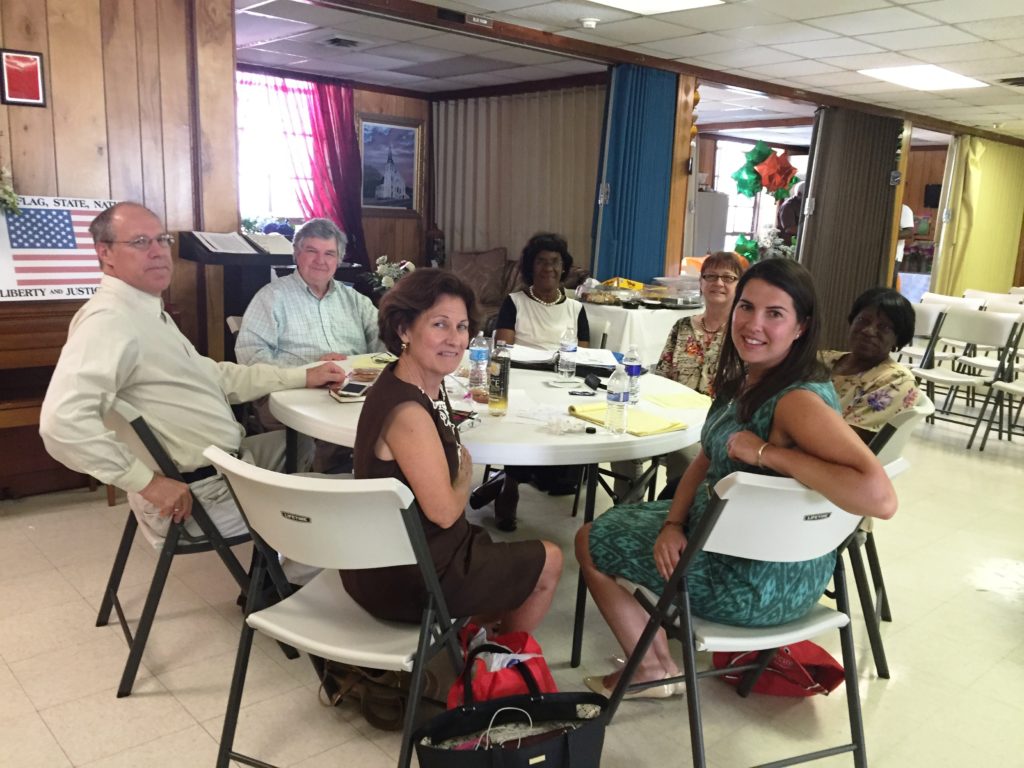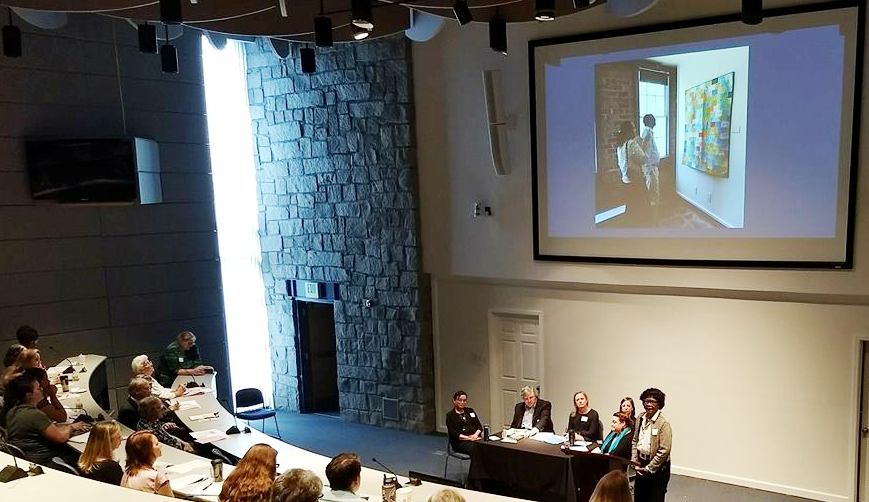Annual Conference
February 16, 2018
“What is the cultural resource professional’s role in documenting monuments and memorial sites?”
Taking place at the Lutheran Theological Southern Seminary of Lenoir-Rhyne University, Reinartz Hall, in Columbia, SC, the meeting discussed the role of professionals in documenting and preserving temporary memorial sites and historic monuments while navigating complex and often controversial situations. The discussion focused on the obligations of professionals to their communities, and opportunities for engagement and education, as well as the need to promote healing.
The session that I participated in addressed the topic of “Archiving the Temporary Memorial & Developing a Statewide Tragedy Response Network”. Led by moderator Meg Moughan, records manager for the City of Charleston Records Management Division, the panelists were:
Elizabeth Alston, Historian & Trustee, Mother Emanuel AME Church, Charleston, SC;
Dr. George W. McDaniel, Ph.D., President, McDaniel Consulting, Charleston, SC;
Rachel Bragg, Preservation Specialist & Exhibit Designer, HW Exhibits, Charleston, SC;
Celeste Wiley, Visual Materials Archivist, South Carolina Historical Society, Charleston, SC;
Leah Worthington, Digital Projects Librarian, Avery Research Center for African American History & Culture at the College of Charleston, Charleston, SC.
We shared our experiences following the Mother Emanuel AME Church tragedy, and described the important ways that Charleston’s historical organizations responded — partnering with the church and forming a Memorabilia Committee to manage the preservation and interpretation of the many thousands of expressions of condolences received from the community, across the country, and around the world. There was also a a wider conversation about how cultural resource professionals might come together to create a disaster response network. Utilizing PALMCOP’s district representative model, we explored the idea of a virtual response toolkit.
The response from the audience illustrated deep-seated concerns, and a number of professionals in attendance signed up to volunteer for the effort. Our panel was also invited to come and speak at local organizations in the state in order to promote this kind of work. Would that such a plan would be comparable to the disaster preparedness plans that museums use consistently every year! A model would be made available and could be tailored to specific needs and realities of a local organization–then shared and discussed in advance with both staff and board to ensure understanding and establish responsibilities in the event that the worst happens. We can imagine how meaningful and effective such a toolkit, put into practice, would be. There is also the added benefit that organizations learning these methods would be, generally, more intentional in working towards cross-cultural understanding and empathy, so that they might help minimize the chances for hateful actions in their own communities. Of course, all of these efforts would call for the commitment of personnel, time, and funds, something that challenges many institutions today, which is all the more reason for the board to be involved at the outset. Would that such a plan were not necessary, but that is the reality that we now face in America.
To learn more on this topic, please read my essay on Museums Commemorating Tragedy – it was made available to all of the conference participants as a resource.
Excerpts of my comments from our session:

First meeting of the Mother Emanuel AME Memorabilia Committee, 6-24-15, one week after the tragedy.

Memorabilia in front of the church following the shootings at Emanuel AME.

A cross memorial with notes and candles.

A detail of a quilt made of blocks sent from around the world, with hand-stitched verses of Amazing Grace. The blocks were stitched together by members of the Charleston Modern Quilt Guild to show their love and support for Church members. .

Exhibit with signed canvas, quilts, and artifacts–one of several that our Memorabilia Committee produced in 2016 and 2017 as part of the annual commemorations.
 George W. McDaniel, Ph.D., is President of McDaniel Consulting, LLC, a strategy firm that helps organizations use history to build bridges within itself and to its broader constituents. The company’s tag line, “Building Bridges through History,” is grounded in McDaniel’s personal beliefs and his experience in site management, preservation, education, board development, fundraising, and community outreach. Rather than using history to divide us, he strives to help organizations use history, especially local history, to enhance cross-cultural understanding and to support local museums, preservation, and education. Dr. McDaniel recently led volunteer efforts with Emanuel AME Church and historical organizations in Charleston to use historic preservation to enhance racial reconciliation and healing. McDaniel is also the Executive Director Emeritus of Drayton Hall, a historic site in Charleston, SC, owned by the National Trust for Historic Preservation. He retired from Drayton Hall in 2015 after 25 years of distinguished service.
George W. McDaniel, Ph.D., is President of McDaniel Consulting, LLC, a strategy firm that helps organizations use history to build bridges within itself and to its broader constituents. The company’s tag line, “Building Bridges through History,” is grounded in McDaniel’s personal beliefs and his experience in site management, preservation, education, board development, fundraising, and community outreach. Rather than using history to divide us, he strives to help organizations use history, especially local history, to enhance cross-cultural understanding and to support local museums, preservation, and education. Dr. McDaniel recently led volunteer efforts with Emanuel AME Church and historical organizations in Charleston to use historic preservation to enhance racial reconciliation and healing. McDaniel is also the Executive Director Emeritus of Drayton Hall, a historic site in Charleston, SC, owned by the National Trust for Historic Preservation. He retired from Drayton Hall in 2015 after 25 years of distinguished service.
A frequent writer, speaker, and facilitator about such issues, he can be reached at gmcdaniel4444@gmail.com or through his website at www.mcdanielconsulting.net.
Header Image: Elizabeth Alston from Mother Emanuel AME Church, and our panel of cultural resource professionals from Charleston, speak about preserving and interpreting memorial sites. Photo credit: PALMCOP


 McDaniel Consulting LLC is a strategy firm that helps organizations use history to build bridges within itself and its broader constituents.
McDaniel Consulting LLC is a strategy firm that helps organizations use history to build bridges within itself and its broader constituents.